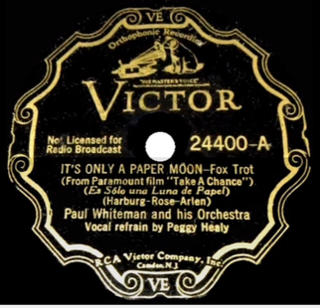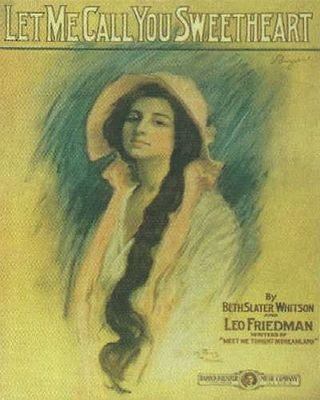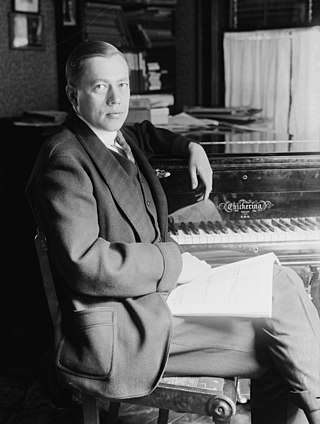
"Smilin' Through" is a popular ballad with lyrics and music by Arthur A. Penn.

"Smilin' Through" is a popular ballad with lyrics and music by Arthur A. Penn.
The song "Smilin' Through" was first published in 1919 by M. Witmark and Sons and Reinald Werrenrath had a very successful recording of it that year. [1]
It was recorded by many singers, including John McCormack, Eleanor Steber, Nelson Eddy, and Judy Garland, and remained a popular standard for decades. Bing Crosby recorded the song in 1956 [2] for use on his radio show and it was subsequently included in the CD On the Sentimental Side (2010). [3]
Penn's song was also closely associated with the 1919 play Smilin' Through by Jane Cowl. The creation of the song and that of the play were independent but intertwined. According to Isidore Witmark in his history of the Witmark and Sons publishing house, Cowl's play was partially rewritten after the song was published, based upon the imagery of the lyrics. Both the title and music of the song were incorporated into the play when it was completed and produced on Broadway in December, 1919. [4]
The melody was also used to accompany the 1922 silent film. The soundtracks for both the 1932 and 1941 MGM films of Smilin' Through feature the song as well. It forms the title music for both films and Jeanette MacDonald sings it in the latter film. Norma Shearer's character sings the song in the 1932 film, dubbed by singer Georgia Stark. [5]
Jazz saxophonist Wayne Shorter plays his own interpretation of the ballad on the album "Beyond the Sound Barrier" (2005). The 12 minute track bears little resemblance to the original; it is more reflective of Shorter's feelings about the song, one of his favorites.
The song was often featured on the BBC TV variety program The Good Old Days , performed by Barry Kent and Robert White, among others
Smilin' Through is a 1919 play by Jane Cowl and Jane Murfin, written under a pseudonym, Allan Langdon Martin. Cowl also starred in the play in a double role and co-directed it with Priestly Morrison. Smilin' Through was produced by The Selwyns and opened at the Broadhurst Theatre on Broadway on December 30, 1919. It included in the cast Orme Caldara as Kenneth and Jeremiah Wayne, Henry Stephenson as John Carteret and Ethelbert D. Hales as Dr. Owen Harding. Scenic design was by Joseph Urban. The play was a popular hit and ran for 175 performances. It also played for a long run on the road, and was one of Jane Cowl's greatest commercial successes.
"On the Sunny Side of the Street" is a 1930 song composed by Jimmy McHugh with lyrics by Dorothy Fields. Some authors say that Fats Waller was the composer, but he sold the rights to the song. It was introduced in the Broadway musical Lew Leslie's International Revue starring Harry Richman and Gertrude Lawrence.

"It's Only a Paper Moon" is a popular song published in 1933 with music by Harold Arlen and lyrics by Yip Harburg and Billy Rose.
"Button Up Your Overcoat" is a popular song. The music was written by Ray Henderson, the lyrics by B.G. DeSylva and Lew Brown. The song was published in 1928, and was first performed later that same year by vocalist Ruth Etting. However, the most famous rendition of this song was recorded early the following year by singer Helen Kane, who was at the peak of her popularity at the time. Kane's childlike voice and Bronx dialect eventually became the inspiration for the voice of cartoon character Betty Boop.
"But Not for Me" is a popular song originally written by George Gershwin and Ira Gershwin for the musical Girl Crazy (1930).

"My Melancholy Baby" is a popular song published in 1912 and first sung publicly by William Frawley. The music was written by Ernie Burnett (1884–1959), the lyrics by George A. Norton.

"Let Me Call You Sweetheart" is a popular song, with music by Leo Friedman and lyrics by Beth Slater Whitson. The song was published in 1910 and was a huge hit for the Peerless Quartet in 1911. A recording by Arthur Clough was very popular the same year too. A 1924 recording identifies a Spanish title, "Déjame llamarte mía".
"It's Easy to Remember " is a popular song written by Richard Rodgers with lyrics by Lorenz Hart.
"I've Got The World on a String" is a 1932 popular jazz song composed by Harold Arlen, with lyrics written by Ted Koehler. It was written for the twenty-first edition of the Cotton Club series which opened on October 23, 1932, the first of the Cotton Club Parades.
"You Brought a New Kind of Love to Me" is a 1930 popular song. The credits list music and lyrics as written by Sammy Fain, Irving Kahal, and Pierre Norman. Since Fain was primarily a music writer and Kahal a lyricist, it may be assumed that the music was by Fain and lyrics were by Kahal, with Norman's contribution uncertain.

"The Gold Diggers' Song " is a song from the 1933 Warner Bros. film Gold Diggers of 1933, sung in the opening sequence by Ginger Rogers and chorus. The entire song is never performed in the 1933 movie, though it introduces the film in the opening scene. Later in the movie, the tune is heard off stage in rehearsal as the director continues a discussion on camera about other matters.

"Down Among the Sheltering Palms" is a popular song.
"I've Got a Crush on You" is a song composed by George Gershwin, with lyrics by Ira Gershwin. It is unique among Gershwin compositions in that it was used for two different Broadway productions: Treasure Girl (1928), when it was introduced by Clifton Webb and Mary Hay, and Strike Up the Band (1930), when it was sung by Doris Carson and Gordon Smith. It was later included in the tribute musical Nice Work If You Can Get It (2012), in which it was sung by Jennifer Laura Thompson. When covered by Frank Sinatra he was a part of Columbia records.
"I Guess I'll Have to Change My Plan" is a popular song published in 1929, with music by Arthur Schwartz and lyrics by Howard Dietz.
"Down in the Valley", also known as "Birmingham Jail", is a traditional American folk song. It has been recorded by many artists and is included in the Songs of Expanding America recordings in Burl Ives' six-album set Historical America in Song.
"Just You, Just Me" is a song from the 1929 musical film Marianne, composed by Jesse Greer with lyrics by Raymond Klages. It was introduced by Marion Davies and Lawrence Gray. The song has had many revisions after its first appearance and has become a jazz standard, having been recorded instrumentally by Red Norvo, Stan Tracey, Oscar Peterson and Lester Young, Buddy Rich, Artie Shaw, Les Paul, Benny Carter, Buddy Bregman, Tex Beneke, Coleman Hawkins, Harry James, Erroll Garner, Benny Goodman, Earl Hines, Joe Pass, Buddy Tate and Abdullah Ibrahim, Les Brown, Bill Coleman and Duke Ellington.
"Paradise" is a 1931 song with music by Nacio Herb Brown and lyrics by Gordon Clifford. It was first sung by Pola Negri in RKO Pictures' 1932 film A Woman Commands, and has since been heard in many other films, including a memorable performance by Gloria Grahame, in the 1949 Nicholas Ray film A Woman's Secret.
I See Your Face Before Me is a popular song composed by Arthur Schwartz, with lyrics by Howard Dietz. It was introduced by Evelyn Laye and Adele Dixon in the 1937 Broadway musical Between the Devil. Two recordings of the song made the charts shortly after the show's debut: Guy Lombardo & His Royal Canadians reached number 12, and Glen Gray & The Casa Loma Orchestra made it to number 13.

Reinald Werrenrath was an American baritone opera singer, who also recorded popular songs and appeared regularly on radio in the early decades of the twentieth century. Werrenrath commonly used the pseudonym Edward Hamilton.
Dear Little Boy of Mine is a World War I song published in 1918. Ernest R. Ball composed the music, and J. Keirn Brennan wrote the lyrics. Vocalist Charles Harrison performed the song. The piece was written for both voice and piano. M. Witmark & Sons was the original publisher of the song.